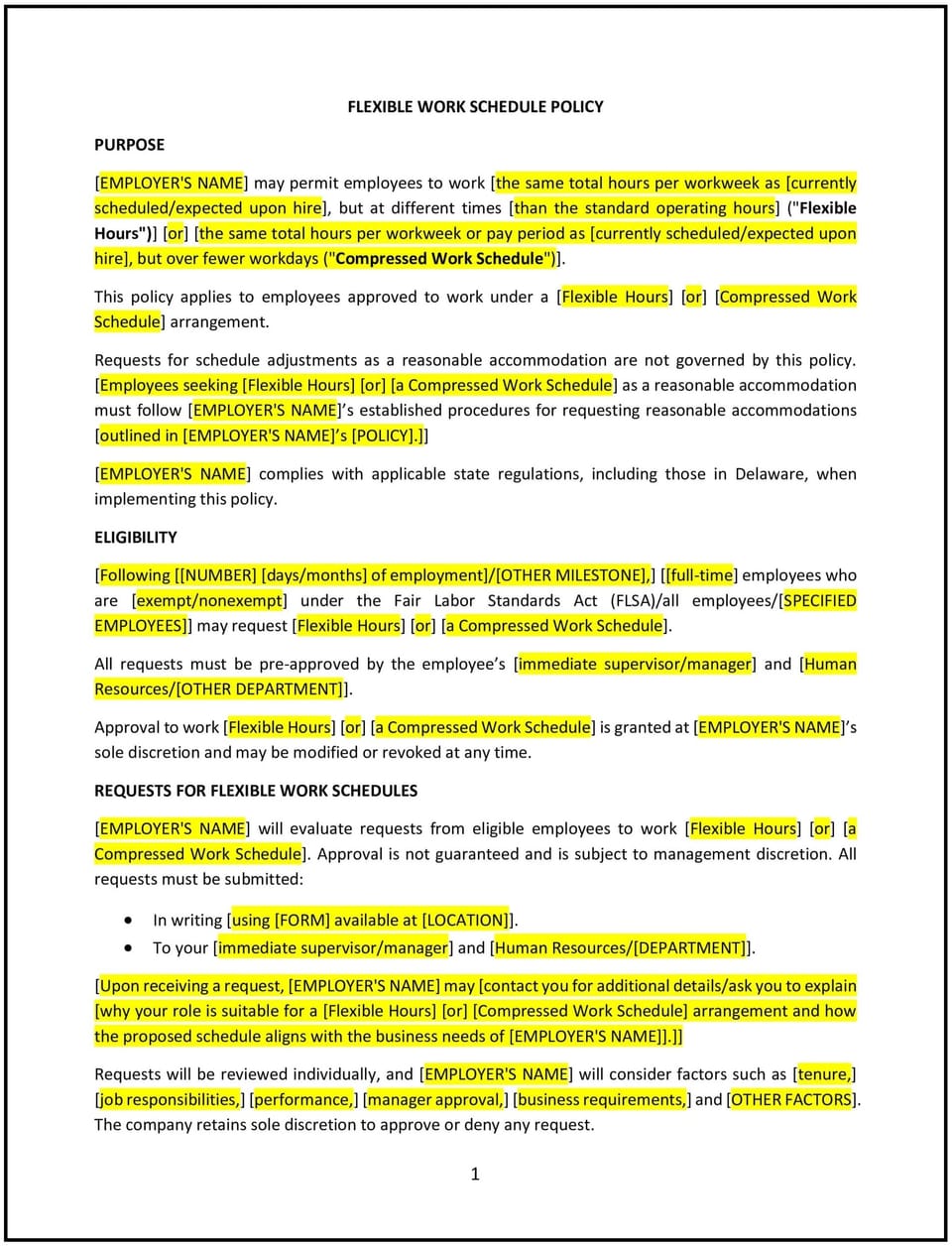Flexible work schedule policy (Delaware): Free template

Flexible work schedule policy (Delaware)
A flexible work schedule policy helps Delaware businesses provide employees with options to adjust their work hours, locations, or arrangements to balance personal and professional commitments. This policy outlines eligibility, procedures, and guidelines for requesting and managing flexible work schedules.
By implementing this policy, businesses can enhance employee satisfaction, improve retention, and boost productivity while maintaining operational efficiency.
How to use this flexible work schedule policy (Delaware)
- Define eligibility: Specify which employees and roles are eligible for flexible work schedules based on job responsibilities and company needs.
- Outline flexible options: Include examples of flexible arrangements, such as telecommuting, compressed workweeks, flextime, or hybrid schedules.
- Establish request procedures: Provide clear steps for employees to request a flexible schedule, including required notice periods and documentation.
- Address performance expectations: Emphasize that flexible schedules must not compromise job performance, productivity, or team collaboration.
- Review arrangements periodically: Schedule regular check-ins to evaluate the effectiveness of the flexible arrangement and make adjustments as needed.
- Ensure compliance: Align the policy with Delaware labor laws, including wage and hour regulations, to ensure legal adherence.
Benefits of using this flexible work schedule policy (Delaware)
This policy offers several benefits for Delaware businesses:
- Enhances employee satisfaction: Supports work-life balance, leading to higher morale and engagement.
- Boosts productivity: Enables employees to work during their most productive hours or in environments that suit their needs.
- Improves retention: Helps attract and retain top talent by offering flexibility to meet diverse employee needs.
- Reduces absenteeism: Provides employees with the flexibility to address personal commitments without taking time off.
- Aligns with modern workplace trends: Keeps the company competitive by adopting practices that reflect evolving employee expectations.
Tips for using this flexible work schedule policy (Delaware)
- Communicate the policy clearly: Ensure employees understand the options, eligibility criteria, and procedures for requesting flexible work arrangements.
- Provide training: Equip managers with the skills to evaluate and manage flexible work requests fairly and effectively.
- Use technology: Leverage collaboration and productivity tools to support remote and flexible work arrangements.
- Monitor performance: Track outcomes and ensure flexible schedules align with company goals and performance expectations.
- Review regularly: Update the policy to reflect changes in Delaware labor laws, industry trends, or company practices.
Q: Why is a flexible work schedule policy important for my business?
A: This policy helps attract and retain top talent, enhances employee satisfaction, and improves productivity by supporting work-life balance and adaptability.
Q: What types of flexible work arrangements are included in this policy?
A: Options may include telecommuting, flextime, compressed workweeks, hybrid schedules, or other arrangements based on company and employee needs.
Q: How can employees request a flexible work schedule?
A: Employees can request a flexible schedule by following the procedure outlined in the policy, which typically includes submitting a written proposal and discussing it with their manager.
Q: How does the policy address performance expectations?
A: The policy emphasizes that employees must maintain productivity, meet deadlines, and collaborate effectively, regardless of their work schedule or location.
Q: How often should this policy be reviewed?
A: This policy should be reviewed annually or when changes occur in Delaware labor laws, workplace trends, or company needs to ensure continued relevance and compliance.
This article contains general legal information and does not contain legal advice. Cobrief is not a law firm or a substitute for an attorney or law firm. The law is complex and changes often. For legal advice, please ask a lawyer.


